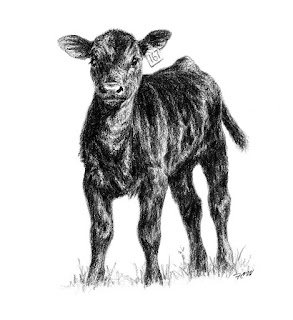Today's world is different than it was not so long ago. Prices received at the point of sale are
highly variable and certain types of calves are even hard to sell. Basic calf development practices have taken a
back seat to accommodate labor availability, time, and various other concerns
among area cattleman. Having a defined calving season, castration, vaccination
protocols, internal and external parasite control, dehorning and other management
protocols are becoming less common place.
Some producers have never taking the time to adopt these practices. Yet, many producers are left wondering why
they are not receiving top dollar for their calves when others are.
A good preconditioned calf is very valuable to the buyer. As the supply of feeder cattle gets more
plentiful and food safety and security issues continue to escalate, those
calves that have gone through the basic on farm processing techniques, have
superior genetics and are part of a preconditioning program will be the ones
preferred by the buyers.
In the coming months with all that is uncertain, cattlemen who
are selling calves that have been given that extra attention and who have a
powerful preconditioning program in place may see their calves at the top of
the market. They may be worth more or
simply be desired by the buyer.
Vaccinations start
early
The vaccination program starts with making sure cows and heifers
are vaccinated 30 to 60 days before breeding to provide protection against
common pathogens that contribute to both reproductive and respiratory disease
such as bovine viral diarrhea (BVD) and other diseases. A pre-breeding
vaccination program will better enable the mother to provide the calf with
colostrum fortified with protection against diseases the calf may encounter
once it hits the ground.
Calves when offered for sale should have received vaccinations that
include against 7 strains of clostridial, IBR, BVD, PI3, BRSV, and Pasteurella.
They should be castrated, dehorned and healed and heifers guaranteed open. You can increase the demand for them by using
quality sires with proven genetics that have calculated or proven EPD’s. and be
sire identified.
Virginia Quality Assured (VQA) Feeder
Calf Program
Consider using or implementing a calf Development program. With the call for more verification that
cattle have been vaccinated originating from a full preconditioning program, The
VQA Feeder Calf Program may help you obtain greater profits. The program is a
hands-on preconditioning program that provides documentation of vaccinations
and other animal health and nutrition programs to buyers of the calves and
tells them the calves are ready to work.
There are reports that show vaccines will
protect calves more if their immune system is not hurt by parasites. If an
animal is dealing with an internal or external parasite problem, those
parasites are occupying part of the animal’s immune system. They are potentially
not as responsive to vaccines. Parasites
maintain their existence at the health expense of the host calf or cow, they may
be drawing nutrients the animal would be using in responding to the vaccination
program.
A proper deworming program will control
parasites, based on the type of
parasites infesting the cattle and time of year. A producer’s veterinarian or
the local extension agent can assist him in targeting certain groups of
parasites and the deworming program needed to control them. Fly tags and other controls will reduce
external parasites and may reduce eye irritations and pinkeye as well as the
new threat of the Asian long-horned tick.
Development of management techniques that incorporate a few of
the items listed above may lead to greater product acceptability and may lead
to potential profits.


No comments:
Post a Comment